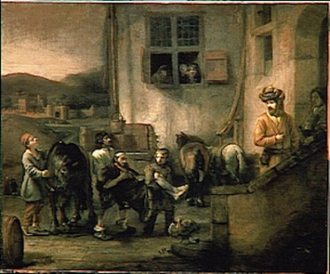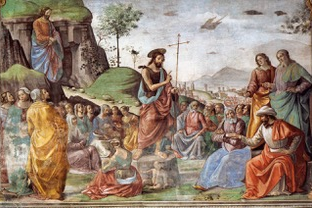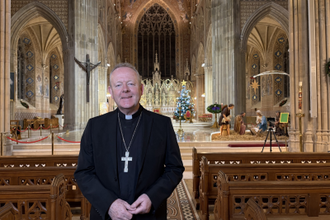Sunday Reflection with Canon Robin Gibbons: 10 July 2022

Rembrandt's Good Samaritan - The Louvre Paris - Wiki Image
Fifteenth Sunday in Ordinary Time
Sometimes I simply wonder how the sections of our readings have been chosen, don't get me wrong, one of the greatest gifts that has come out of our Conciliar Reforms in the Liturgy has been the lectionary and its cycles from both OT and NT! This has been a boon to me and countless others, the rich food of the word there before us, salvations song in our hearing and in our reading! But occasionally one of the readings leaves us wanting to know more than just what is being talked about.
Our first reading from Deuteronomy 30, succinct and beautiful as it is, suggests that Moses' command to the Israelites, indicating that they must return to the Lord, heed and live the commandments, is exactly what all of us are to do, but for me that passage in all its poetic nuance, starts to hint at another kind of question, something more than mere observance of Torah, and it is this trajectory which could be confusing, at the end of the passage what exactly is that;
"something very near to you,
already in your mouths and in your hearts;
you have only to carry it out."(Dt 30:14)
Now a good homilist might well supply that answer without turning it into a scriptural lesson, but we can immediately return to the beginning of our reading, 'it's there, 'we say, but if any of us are to take this seriously, we need to know what exactly is within us. So what is it? Well, it's a step further into relationship and commitment. If we take the trouble to read a bit more than our set passage we discover a little further on that the stress very subtly shifts,
for instead of heeding God's voice and keeping the statutes and commandments we move on further into an encounter, Moses says:
'…by loving the LORD, your God, obeying his voice, and holding fast to him. For that will mean life for you, a long life for you to live on the land which the LORD swore to your ancestors, to Abraham, Isaac, and Jacob, to give to them.'
(Dt 30: 20)
Loving in obedience, and understanding obedience in its real sense of discerning together, plus listening to the Spirit, so that we may act in a freer more embracing way, together with that image of cleaving fast to God in a two way relationship, all this is what we need to find within ourselves!
Our second reading from Colossians really needs to come after the Gospel for it is a coda, an affirmation of who and what our Incarnate Lord is in relationship to each and every one of us. Hold on to the following two short sentences, for they underpin our utter need for Christ as the one in whom the fullness of all things comes together:
"For in him all the fullness* was pleased to dwell,
and through him to reconcile all things for him,"(Col1:19-20)
I only wish those of us who bicker and fight over areas of doctrine, ethics and liturgy, or criticise the ministry of the Pope and what he is doing for the Church, would push a pause button in our own lives, then let words like these enter into our heart, mind and soul, we might think and behave differently if only we took time to listen (there's that root of obedience again!)
But we have a treasure, the parable of the Good Samaritan that challenges any egotism and narcissistic tendencies we might have within us. We know the story well, we understand that here Jesus is pointing out the practicalities of obeying that commandment to love and serve in a poignant way. To love neighbour as oneself is at the heart of His double commandment. Yet even with our rich understanding of faith, we have to revisit time and time again that question of just who is my neighbour, because we can never ever fully answer that question until we actually face the Christ of the Last Judgement this because we are very good (usually a default position) at leaving out certain categories of living beings!
So perhaps I can only speak for myself here. When I was younger I excused the Priest and the Levite because of the burdens that 'The Law' placed on them, and we need to recognise that, also the terrible danger they themselves were in, is it a trap? It's very difficult for anybody when faced with religious certitude or seemingly to be challenged in the deeper realms of faith, to let go, or perhaps be foolhardy (or courageous ) enough to move boundaries. Yet isn't that in the end what Christ will gently lead us to at important moments of encounter, every single time?
You see he makes us look beyond the obvious, for that battered and robbed man of no name, nearly dead, and the Samaritan, outcast and unclean are also brothers in God's family, at this point in the story they are the least and the lost, as sometimes we shall be! Yet if we learn anything it is that Christ the true icon of the Holy One, points to the Samaritan and the robbed man as true icons of himself, for the Samaritan is the one who has a fullness of life and that utterly reconciling gift of mercy (see our Colossians reading) and the robbed man is receiving it, not the others!
But I end with this prosaic sentence, to my mind worthy of intense scrutiny, for it reveals the Lord speaking to us on that day when we come before Him for mercy, He will always return for us, and after we have been healed, restored, and reconciled, will himself pay the debt owed or the ransom needed for what we have used . "The next day he took out two silver coins and gave them to the innkeeper with the instruction, 'Take care of him. If you spend more than what I have given you, I shall repay you on my way back."
(Lk 10:25) Amen, Come Lord Jesus!
Lectio
Colossians 1: 15-20
Christ Jesus is the image of the invisible God,
the firstborn of all creation.
For in him were created all things in heaven and on earth,
the visible and the invisible,
whether thrones or dominions or principalities or powers;
all things were created through him and for him.
He is before all things,
and in him all things hold together.
He is the head of the body, the church.
He is the beginning, the firstborn from the dead,
that in all things he himself might be preeminent.
For in him all the fullness was pleased to dwell,
and through him to reconcile all things for him,
making peace by the blood of his cross
through him, whether those on earth or those in heaven.
From Pope Francis text on the canonisation of Mother Theresa of Kolkata - September 4th 2016
Following Jesus is a serious task, and, at the same time, one filled with joy; it takes a certain daring and courage to recognize the divine Master in the poorest of the poor and to give oneself in their service. In order to do so, volunteers, who out of love of Jesus serve the poor and the needy, do not expect any thanks or recompense; rather they renounce all this because they have discovered true love. Just as the Lord has come to meet me and has stooped down to my level in my hour of need, so too do I go to meet him, bending low before those who have lost faith or who live as though God did not exist, before young people without values or ideals, before families in crisis, before the ill and the imprisoned, before refugees and immigrants, before the weak and defenceless in body and spirit, before abandoned children, before the elderly who are on their own. Wherever someone is reaching out, asking for a helping hand in order to get up, this is where our presence - and the presence of the Church which sustains and offers hope - must be.


















